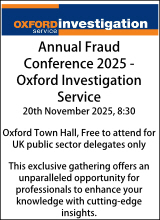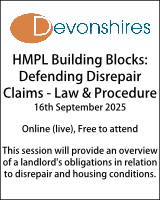Authority to participate in legal proceedings and rights of audience
In light of a High Court ruling that has caused shockwaves in the legal sector, Geoff Wild considers how councils should set themselves up to conduct litigation lawfully and ensure the person authorised to conduct legal proceedings on behalf of the council is legally qualified and that any non-lawyers are properly authorised.
- Details
1. Legal Background
(1) The power for a council to bring and defend legal proceedings has a statutory basis, which is typically reflected in its constitution. Without arrangements giving authority to various officers, a council could not bring or defend legal proceedings or appear before a court. In order to do this, there need to be two specific levels of authorisation:
(a) Authority to institute, defend or participate in and settle any legal proceedings; and
(b) Authority to appear in court.
(2) Under some constitutions, these authorisations are only given to the Monitoring Officer (or equivalent senior officer), without provision for other officers to be duly authorised. A number of council directorates or departments, for reasons related to the functions of their business, often institute, defend, participate or settle legal proceedings and appear in court without being clear as to whether the two specific levels of authorisation above are in place. The relevant activities include:
- Waste management: to carry out statutory functions, directed surveillance under the Regulation of Investigatory Powers Act 2000 and to make applications before a Magistrates’ Court;
- Insurance: to bring small claims related to their business operations and to appear in the County Court;
- Countryside Access Service: to carry out statutory functions and appear before Public Enquiries;
- Integrated Youth Services: to carry out statutory functions and appear before Magistrates’ Courts to make applications on behalf of the Council;
- Special Educational Needs and Disability: to deal with disputes in the First-Tier Tribunal between a local authority and parents or young people and special educational needs provision;
- Court of Protection: to make decisions on financial or welfare matters for people who lack mental capacity;
- Trading Standards: to carry out statutory functions and appear before Magistrates’ Courts to make applications on behalf of the Council.
(3) Section 222 of the Local Government Act 1972 (‘LGA 1972’) provides a power for the Council to prosecute or defend legal proceedings:
“Where a local authority consider it expedient for the promotion or protection of the interests of the inhabitants of their area
(a) they may prosecute or defend or appear in any legal proceedings and, in the case of civil proceedings, may institute them in their own name, and
(b) they may, in their own name, make representations in the interests of the inhabitants at any public inquiry held by or on behalf of any Minister or public body under any enactment.”
(4) The Legal Services Act 2007 (‘LSA 2007’) sets out a regulatory framework for the provision of legal services and prescribes how ‘rights of audience’ to appear in court are granted. Sections 12, 18 and 19 make clear that a person only has a right of audience before a court where they are either an ‘authorised person’ or an ‘exempt person’.
(5) An ‘authorised person’ is a solicitor, barrister, CILEX practitioner with litigation and advocacy rights or Chartered Legal Executive Advocate for Higher Rights of Audience, who is a member of their relevant professional regulatory body. As long as an authorised person remains a member of such a body and complies with their rules and restrictions, they may exercise rights of audience and conduct litigation in all proceedings in all courts.
(6) Schedule 3 1(3) of the LSA 2007 provides that an ‘exempt person’ includes a person who has a right of audience before a court granted under any enactment.
(7) Section 223 of the LGA 1972 is an enactment relevant to ‘exempt persons’ and provides that:
“Any Member or officer of a local authority who is authorised by that authority to prosecute or defend on their behalf, or to appear on their behalf in, proceedings before a Magistrates’ Court shall be entitled to prosecute or defend or to appear in any such proceedings, and, to conduct any such proceedings.”
(8) A council’s constitution usually gives effect to the legislative provisions above by:
(a) Delegating the power to prosecute or defend legal proceedings in s.222 of the LGA 1972 to the Monitoring Officer (or equivalent post title); and
(b) Authorising the Monitoring Officer (or equivalent) to appear in any court proceedings. For example:
“The Monitoring Officer is authorised to institute, defend or participate in and settle any legal proceedings in any case where such action is necessary to give effect to decisions of the Council or in any case where they consider that such action is necessary to protect or pursue the Council’s interests or where they consider it expedient for the promotion or protection of the interests of the inhabitants of the area.”
(9) It is therefore essential that the Monitoring Officer (or whoever the council authorises to conduct legal proceedings on its behalf) is an ‘authorised person’, as detailed above, in order to be able to represent the council in any court. Carrying on an authorised reserved legal activity without entitlement is a criminal offence under s.14 of the Legal Services Act 2007, punishable by imprisonment and/or a fine.
(10) The combination of the legislative provisions above and the constitutional delegation gives the Monitoring Officer (or equivalent) authority to conduct and appear in any legal proceedings on behalf of the council, whether they are civil or criminal in nature. However, the Monitoring Officer should also have specific delegated authority to authorise other officers, whether within the Legal Services department or outside Legal Services, pursuant to the statutory provisions above.
2. Authority to Appear in Court
(1) Any officer who represents a council in a civil or criminal court for a hearing or trial must:
(a) have a right of audience; and
(b) be duly authorised, in accordance with the provisions above.
(2) A right of audience is the right to appear before and address a court, without which a person cannot appear before a court. There is no common law right of audience and a right of audience cannot be granted by consent of other parties to the case.
Magistrates’ Courts
(3) As regards legal proceedings in the Magistrates’ Court, s.223 LGA 1972 has the effect of giving local authority officers that right of audience after the officer is duly authorised by the council. Otherwise, only an admitted solicitor, barrister, eligible CILEX or a litigant in person may normally exercise a right of audience before a Magistrates’ Court.
(4) Section 223 LGA 1972 only permits council officers to appear in a Magistrates’ Court and not any other court (e.g. Crown Court, County Court, High Court or any Appeal Court). Therefore, a council (whether by delegated authority or otherwise) may only use s.223 to authorise officers who are not legally qualified with rights of audience to appear in the Magistrates’ Court.
All other courts
(5) Only solicitors, barristers and eligible CILEX with rights of audience under the LSA 2007 are permitted to appear in criminal or civil proceedings in all courts. This is because they normally have rights of audience as ’authorised persons’ under the LSA 2007 (as detailed above). It is not possible for other council officers to appear in any legal proceedings (subject to the exceptions described below).
3. Authority to institute, defend or participate in and settle any legal proceedings
Legal Officers
(1) As a part of their job and in furtherance of the council’s interests, qualified lawyers within a Legal Services department are regularly required to institute, defend or participate in and settle any legal proceedings. The constitution should therefore ensure that the Monitoring Officer has delegated authority to authorise qualified lawyers to give effect to s.222 of the LGA 1972.
(2) The Monitoring Officer should hold a list of authorised officers and review the list periodically as appropriate.
Non-Legal Officers
(3) As mentioned above, council officers who are not qualified lawyers may only appear in a Magistrates’ Court after being duly authorised by the council under s.223 LGA 1972. In some cases, officers work under the impression that they have already been duly authorised to bring proceedings and appear before a Magistrates’ Court. However, a closer review of the authorities presented by relevant departments often results in this not being the case.
(4) As a result, it unwise for a council to rely on existing authorities that may not be sufficient and necessary for the purposes of s.222 and s.223 of the LGA 1972. The constitution should permit the Monitoring Officer to oversee and regularise the position with the necessary ability to give the required levels of authorisation described above. It is more efficient and cost effective for the Monitoring Officer to delegate authority to officers pursuant to s.222 and s.223 of the LGA 1972, rather than bringing a report to the full Council for decision on each occasion.
(5) In addition, s.60 of the County Courts Act 1984 permits any duly authorised officer of the council to address the court where an action is brought in the County Court for either the recovery of possession of a house belonging to the authority or the recovery of any rent, mesne profits, damages or other sum claimed by the authority in respect of the occupation by any person of such a house.
(6) Furthermore, non-legal officers may ask for permission to exercise a right of audience in any particular set of court proceedings under Schedule 3 1(1)(2)(b) of the 2007 Act, but that will be at the discretion of the Judge.
(7) Schedule 3 1(7) of the 2007 Act also permits any person employed to assist in the conduct of litigation, and acting under the supervision of an authorised person who can conduct litigation, to appear in chambers hearings in the County Court and High Court.
(8) Following the creation of the single Family Court, these rights were extended by Schedule 10, Part 2, Paragraph 98(1) of the Crime and Courts Act 2013 to apply in the Family Court (save for before a single Lay Magistrate or bench of Lay Magistrates).
(9) In the case of Mazur v Charles Russell Speechlys [2025], the Administrative Court restated the position in the Legal Services Act 2007 and the SRA’s 2022 guidance on effective supervision that only an authorised person may conduct litigation. Care must be taken to ensure that unqualified staff are only permitted to support an authorised person in the conduct of litigation but not conduct it themselves. Legal assistants, unauthorised legal executives and paralegals may therefore perform mechanical tasks, such as service of process, preparing bundles and searches, but not assume responsibility for a case or exercise professional judgment in respect of it.
(10) Adhering to these provisions provides resilience to court action brought by or against a council, serves to increase efficiency and reduces both costs and the risk of acting ultra vires, or for individual officers to incur criminal liability under the LSA 2007.
Amendment to Constitution
(1) A council’s constitution should specifically allow the Monitoring Officer (or whoever the council authorises to conduct legal proceedings on its behalf) to delegate authority to other officers so that they may be duly authorised to prosecute or defend legal proceedings (under s.222 of the LGA 1972) and appear in the Magistrates’ and County Courts (under s.223 LGA 1972 and s.60 CCA 1984).
(2) In order to give effect to the recommendations above, a simple amendment to a constitution can be made, as underlined below:
“The Monitoring Officer is authorised to institute, defend or participate in and settle any legal proceedings, or authorise others to do so, in any case where such action is necessary to give effect to decisions of the Council or in any case where they consider that such action is necessary to protect or pursue the Council’s interests or where they consider it expedient for the promotion or protection of the interests of the inhabitants of the area.”
Geoff Wild is a Legal and Governance Consultant. He is celebrating his 40th anniversary as a local government lawyer.
This is the latest in a series of articles Geoff has written – previous contributions include:
- Member and officer indemnities
- Complying with the Public Sector Equality Duty
- Members’ interests, bias and pre-determination
- Who runs councils in no overall control?
- Recording and publishing officer decisions
- The role of substitutes
- What next for parish councils?
- Dual-hatted members and local government reorganisation
Trust Solicitor (Employment & Contract Law)
Trust Solicitor (Public & Healthcare Law)
Locums
Poll


























